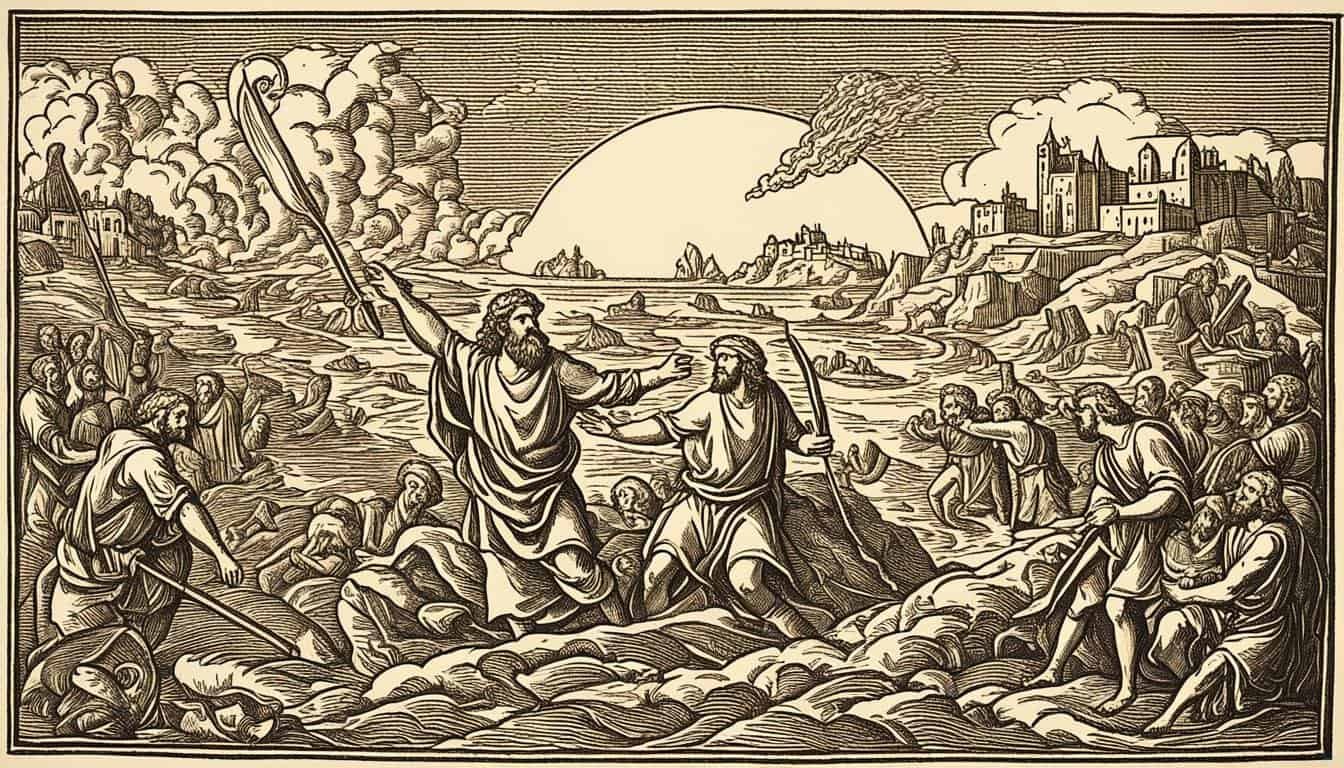Many of us think the Bible is full of stories about faith, love, and redemption. But there’s also a dark side in the early pages of Genesis. We often forget about the gruesome violence that shook biblical history.
In this article, we’re exploring the top 10 violent acts in Genesis. We will look at these troubling events that tested the beliefs and morals of their time.
Genesis tells us about sibling fights that led to murder and a flood that wiped out most life on Earth. It also includes the destruction of wicked cities. These stories show just how low human nature can go and the heavy prices paid for these actions. We aim to understand why these events happened, their context in history, and their lessons for us.
Join us as we uncover Genesis’ dark tales. Violence and brutality are central but often underlooked themes. Exploring the stories can be unsettling. But it’s also a chance to learn about the complexities of human nature and how divine judgment plays out.
Let’s navigate through these ancient stories together and see what they teach us about human behavior and its consequences.
Key Takeaways:
- Genesis contains stories of brutal acts of violence that are often overshadowed by narratives of faith and redemption.
- The top 10 brutal acts of violence in Genesis include sibling murder, global floods, annihilation of cities, and more.
- Exploring these stories provides insights into human nature, divine judgment, and the consequences of violence.
- These tales challenge us to confront the darker aspects of biblical history and reflect on their significance.
- Join us as we unravel the mysteries and complexities of these brutal acts of violence in Genesis.
Cain’s Murder of Abel
The story of Cain and Abel is a tragic tale from the Bible. It’s a clear example of what can happen when jealousy and rage take over. We meet them in the book of Genesis as sons of Adam and Eve. Cain shocked everyone by killing his brother Abel, making Abel the first murder victim in the Bible.
In Genesis 4:8, we see this moment as Cain killed Abel. He was jealous because God liked Abel’s offering more. This led Cain to do something terrible. He took his brother to a field and killed him there.
“And Cain talked with Abel his brother: and it came to pass, when they were in the field, that Cain rose up against Abel his brother, and slew him.” (Genesis 4:8)
This act of jealousy and rage not only ended Abel’s life but also changed how we see the world. Cain faced severe punishment; he had to leave his family and roam the earth alone. This tragically marked the beginning of a violent chapter in human history.
This story warns us about the danger of letting our emotions control us. It teaches the value of peace and solving problems without violence. These lessons are important for us still today.
Genesis shows us early on the bad effects of jealousy and anger. The Cain and Abel story makes us think about good and evil in us. We should aim for a world filled with love and peace, rather than hate.
The Tragic Story of Cain and Abel
To really understand what happened between Cain and Abel, let’s look at their story. Adam and Eve had two sons. Abel was a shepherd, caring for flocks, while Cain worked the land.
They both made offerings to God. God liked Abel’s offering more. This made Cain very jealous of his brother.
Cain’s jealousy turned into rage because God didn’t like his offering. He was so mad that he killed Abel. This was the first murder.
In the field, Cain talked to Abel but then killed him in anger. This act changed everything, forever marking violence in human history.
God knew what Cain had done and punished him. Cain had to leave his family and wander alone.
The Cain and Abel story warns us about anger and violence. It tells us to choose love and peace over hate. It’s a lesson we all should remember.
| Section | Description |
|---|---|
| Characters |
|
| Key Elements |
|
| Lesson Learned | The consequences of uncontrolled emotions and violence |
The Global Flood Judgment
Genesis 6-8 tells of a huge flood that covered the earth. This flood was sent by God as a punishment because the world was filled with evil. Animals and people were not spared, except for those on Noah’s special boat.
“And the waters prevailed so mightily on the earth that all the high mountains under the whole heaven were covered.” – Genesis 7:19
This snap decision to flood the earth showed how serious God is about justice. The flood wiped out everything bad, leaving only Noah and his family alive. It was like a big bath for the world, refreshing it in God’s eyes.
After the flood, the world was different. Noah’s story gave people a chance to do better. It teaches us that following God and living righteously is very important. God’s act of saving Noah is a lesson in mercy and an opportunity to start over.
The Ark: A Symbol of Hope

Noah’s ark, shown above, was a huge ship built to save living things from the flood. It tells a story of hope and shows God’s love and care for the faithful. Despite the flood’s vast destruction, God’s promise of salvation was very real through the ark.
When we think about the flood, we see God’s fairness and kindness. This event reminds us that God punishes sin but also offers a way to escape through His grace and mercy.
The Destruction of Sodom and Gomorrah
Sodom and Gomorrah were known for their great evil. They suffered a terrible end. This story warns of God’s judgment. It is told in Genesis 19:24-28. The destruction of these cities was complete.
“Then the Lord rained down burning sulfur on Sodom and Gomorrah—from the Lord out of the heavens. Thus he overthrew those cities and the entire plain, destroying all those living in the cities—and also the vegetation in the land. But Lot’s wife looked back and she became a pillar of salt.”
In Genesis, we read of the destruction. Fire and sulfur destroyed the cities. All living things and the land were ruined. This is a clear lesson about God’s response to evil.
God’s righteous act was clear then. Wickedness would not be ignored. The story caused great fear. It stands as a warning today against evil. It reminds us of God’s judgment.
The Annihilation of Wicked Cities
Sodom and Gomorrah remind us God judges all societies. Their fate shows God’s absolute power. It warns against continuing in evil.
It’s a call for us to check our ways. Are we living right before God? The story urges us to seek righteousness. Let’s learn from their fate and walk in God’s ways.
The Unrelenting Power of God
The story shows God’s unstoppable power to punish evil. It reminds us of the seriousness of God’s judgment. Our choices affect our relationship with Him.
It teaches us to seek right living. The story brings hope. It shows God’s justice will win in the end.
The Near Sacrifice of Isaac
In Genesis 22:9-10, we read about the intense moment Isaac was nearly sacrificed. It shows how far Abraham’s faith went and how he was ready to obey God fully. This story underlines how deep Abraham’s love for God was.
It depicts a harsh reality – Abraham’s obedience to God involved a test that seems extreme. God asked Abraham to offer Isaac as a burnt offering. Imagine the heartbreak Abraham must have felt to do this to his son.
“Abraham bound Isaac his son and laid him on the altar, on top of the wood. Then Abraham reached out his hand and took the knife to slay his son.” – Genesis 22:9-10
This scene causes emotional turmoil and makes us think deeply. It’s key to look at it as a story of faith and obedience to God. It shows how much Abraham trusted in God, even when it meant giving up his beloved son.
Right at the moment Abraham was ready to sacrifice Isaac, something incredible happened. An angel appeared and provided a ram for sacrifice instead. This turn of events speaks volumes about obeying God wholeheartedly.
This saga isn’t just about a singular act. It echoes throughout history as a story of loyalty and true faith. The story of Isaac’s near sacrifice brings up profound questions about our connection with God and understanding His intentions.
Reading this, we’re challenged to consider our own faith and obedience to God. It makes us wonder, would we be able to give up something precious for God without question? It’s a deep question for personal reflection.
Lessons from the Near Sacrifice of Isaac
- Obedience to God’s commands, no matter how difficult or painful, is crucial in our spiritual journey.
- Trust in God’s faithfulness and His ultimate plans, even when faced with unimaginable challenges.
- God provides a way out when we remain steadfast in our commitment to Him.
Reflection Questions
- How does the story of the near sacrifice of Isaac challenge your perspective on obedience and trust?
- Are there areas in your life where you struggle to fully surrender to God’s plans?
- What can you learn from Abraham’s unwavering faith and obedience?
Comparing Abraham’s Sacrifice to Other Acts of Violence
| Event | Actors | Reasons | Aftermath |
|---|---|---|---|
| The near sacrifice of Isaac (Genesis 22:9-10) | Abraham and Isaac | Obedience to God’s testing command | Divine intervention, provision of a substitute sacrifice |
| Cain’s murder of Abel (Genesis 4:8) | Cain | Jealousy and rage | Cain is cursed by God and becomes a wanderer |
| The destruction of Sodom and Gomorrah (Genesis 19:24-28) | God | Judgment on the wickedness of the cities | Cities and their inhabitants are destroyed by fire and burning sulfur |

The Massacre of the Shechemites
In the book of Genesis, we learn about a terrible act of revenge. It’s known as the massacre of the Shechemites. This event happened after Dinah, Jacob’s daughter, was harmed.
Angry about what happened to their sister, Simeon and Levi found a way to get back at Shechem. They asked all men in Shechem to be circumcised. They made it seem like they wanted peace.
“On the third day, when they were all still in pain, two of Jacob’s sons, Simeon and Levi, Dinah’s brothers, took their swords and attacked the unsuspecting city, killing every male. They also looted the city, seizing their flocks and herds and all their wealth.”
Simeon and Levi then killed all the men in Shechem as revenge. They were very brutal. This caused suffering and was not approved by their father, Jacob. He was very upset by what they did.
This event teaches us about seeking justice with violence. It might seem right to act when we are angry, but it often brings more pain.
Reflecting on this story helps us see the right way to seek justice. Violence only leads to more harm. Instead, forgiveness and peaceful actions are the keys to changing for the better.

The Massacre of the Shechemites – A Grim Reminder
This sad event reminds us not to use violence as an answer. It shows us we need to forgive and find peaceful ways to solve problems. Let’s remember to act with love and understanding to make the world a better place.
| Key Details | Description |
|---|---|
| Event | The Massacre of the Shechemites |
| Location | The city of Shechem |
| Perpetrators | Simeon and Levi |
| Motivation | Brutal vengeance for the defilement of Dinah |
| Actions | Killing every male, looting the city |
| Consequences | Widespread devastation, condemnation by Jacob |
Violence does not solve anything. Only love, understanding, and peace can make lasting change.
The Slaughter of the Midianites
The slaughter of the Midianites stands out in the Bible. It shows the severe consequences of seducing Israel. The Israelites were led away from their faith by the Midianites. This led to a significant tragedy.
Midianites influenced the Israelites toward sin. This angered the Lord. Moses, as a part of divine justice, sought vengeance on them. The resulting punishment was severe and extensive.
“And the Lord spoke to Moses, saying: ‘Take vengeance on the Midianites for the children of Israel…And Moses spoke to the people, saying: ‘Arm some of yourselves for war, and let them go against the Midianites to take vengeance for the Lord on Midian.'” (Numbers 31:1-3)
The Israeli army, following Moses and God’s guidance, struck against the Midianites. They killed every Midianite male. Additionally, they executed all Midianite women who were not virgins.
This action by the Israelites was very violent. It was a message about the seriousness of leading people away from God. Such behavior had dire consequences, showing divine justice’s ruthless side.
The Brutal Retribution
The Israeli army acted with intense anger and a belief in God’s justice. Killing the Midianite men showed how serious their actions were. It warned of the quick punishment for defying God’s rules.
However, they didn’t only kill the men. The non-virgin women among the Midianites, who had tempted the Israelites, met a terrible fate. They were also deemed responsible and had to face the consequences of their actions.
A Somber Reminder
The Midianites’ slaughter is a grim part of biblical history. It serves as a moral lesson. It highlights the importance of keeping faith and avoiding temptations. The severe punishment reflects God’s firm stance on righteousness.
Reflecting on this event reminds us to stay true in faith. The Midianites’ fate warns us about the dangers of deception. Let it guide us in our quest for spiritual truth and obedience to God’s word.
| Key Points |
|---|
| The slaughter of the Midianites was a brutal act of retribution for seducing Israel. |
| The Israelite army, guided by Moses, slew every Midianite male. |
| Non-virgin Midianite women, who had led the Israelites astray, also faced execution. |
| This event serves as a reminder of the importance of remaining faithful to God’s commandments. |
Jacob’s Daughter Dinah is Defiled
In Genesis 34:1-31, we face a heartbreaking story. It shows us how forced sexual violence can tear a family apart. Dinah, Jacob’s daughter, is forced by Shechem, a prince, causing deep pain.
It all starts when Dinah visits the local girls. Sadly, Shechem grabs her forcefully because he wants her. This leaves Dinah deeply hurt and causes chaos in Jacob’s home.
“And Shechem said unto his father Hamor, Get me this damsel to wife…And the sons of Jacob answered Shechem and Hamor his father deceitfully because he had defiled Dinah their sister.”
(Genesis 34:8-9)
Outraged, Simeon and Levi come up with a plan for revenge. They trick the Hivites into a deal. They say they’ll agree if all the men get circumcised. But, they actually plan to attack them after the surgery.
When the men are at their weakest, Simeon and Levi attack. They kill the males, including Shechem and Hamor, and loot the city.
“They slew Hamor and Shechem his son with the edge of the sword and took Dinah out of Shechem’s house…”
(Genesis 34:26)
Their revenge turns into a brutal event. This single act shapes the fate of Jacob’s family, causing ongoing tension and violence in the future.

Dinah’s story is a stark lesson in how forced sex can damage lives and families. It’s a tale of the deep harm caused by violence, showing its lasting effects.
Next, let’s look at a Genesis story where violence and betrayal hit home. Joseph faces jealousy from his own brothers, leading to his enslavement.
How did the patriarchs in Genesis respond to acts of violence?
The patriarchs in Genesis responded to acts of violence in different ways. For example, Abraham chose to negotiate and make peace with others, while Jacob and his sons retaliated forcefully. These unforgettable moments patriarchs lives reflect their varying beliefs and approaches to conflict resolution.
Joseph’s Brothers’ Violence
The tale of Joseph’s brothers’ violence shows jealousy and betrayal can lead to terrible acts. In the book of Genesis (37:18-28), we see sibling rivalry reach its worst.
Joseph’s brothers covet his coat, a sign of their dad’s love. Fueled by anger, they dump him in a pit. Later, they sell him into slavery, forever changing his destiny.
This shocking act tears their family apart. Joseph faces hardship but ultimately finds redemption.
This story warns us about jealousy’s destructive force. It’s a lesson on showing care and understanding. At the same time, it tells us about human strength in tough times.
Affiliate Disclosure: "As an Amazon Associate I earn from qualifying purchases made from links in this post. We are a participant in the Amazon Services LLC Associates Program, an affiliate advertising program designed to provide a means for us to earn fees by linking to Amazon.com."

